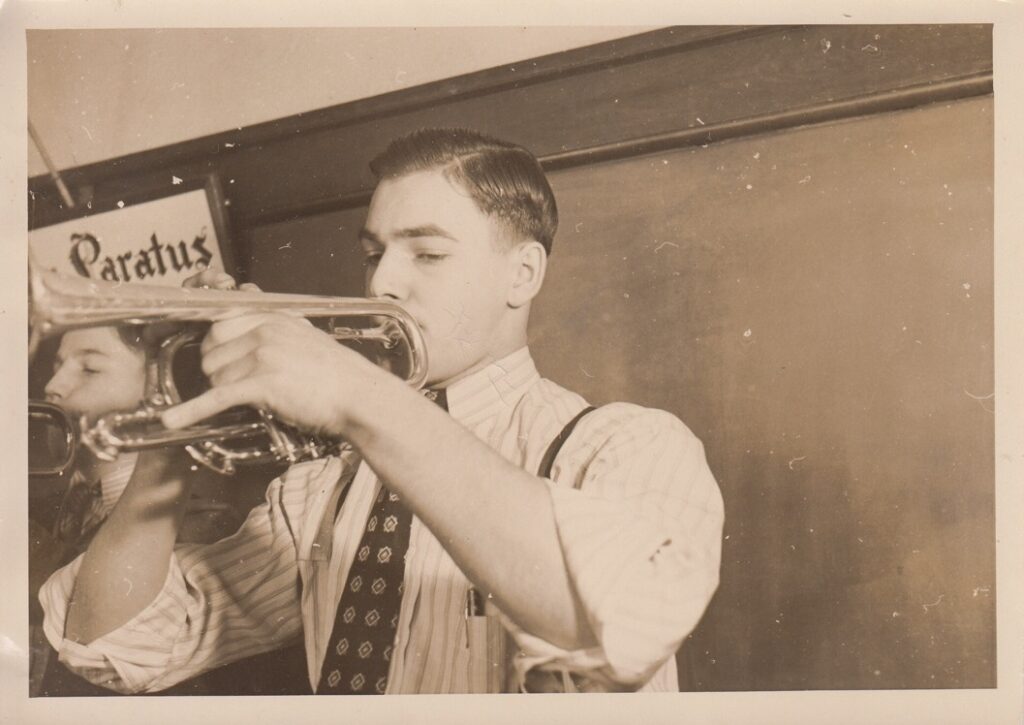Howard Hollinger, or Holly, as his fellow soldiers in the Coast Guard and the Navy would call him, was truly the storybook All-American. Growing up as a child in Akron, Ohio, Holly and his father often went fishing at Lake Erie.
“We saw these Coast Guard cutters and boy, they were slick,” Holly said. “I thought, ‘Boy, I could run one of those babies.’”
Just like that, Holly joined the Coast Guard and was shipped out to Curtis Bay, Maryland on the south side of Baltimore for boot camp. After a grueling six months in Curtis Bay, Holly and about 40 others set out for San Juan, Puerto Rico in 1942. A select four from that group were sent down to Ponce, a large Puerto Rican city on the southern coast of the island, where Holly first got into radio by recommendation of his captain, who insisted he go to radio school.
Dressed in his Coast Guard “whites,” Holly set off for Atlantic City in a Douglas C47 transport plane, stopping in Guantanamo, Cuba along the way. Before heading to Atlantic City, Holly was a granted a two-week leave in his hometown of Akron.
“And that’s when I met that gal,” Holly said as he winked and smiled at his wife across the room. Holly and Grace had two dates that week, thanks to a mutual friend who decided Holly needed a date for their trip to Cleveland that weekend.
“He was great,” Grace said. “He was a gentleman all along. When I dated him, I loved to go out with him because he was always so nice to everyone.”
After spending time with friends and family in Akron for two weeks, Holly made his way to Atlantic City for radio school. At radio school, Holly learned military code, and was required to type it at 40 words per minute before he could graduate. After graduating from radio school in Atlantic City, Holly and nine others were sent to Casco Bay in Maine to study ultra high frequency direction finding – a new form of military radio communications that took place at a frequency too high for the Germans and Japanese to be able to detect with their equipment.

At this point, Holly knew he’d be bound for Alaska soon, where he knew they were building these ultra-high-frequency direction finders. He was granted another two-week leave before heading out to Alaska, and went on two more dates with Grace.
“I thought she was pretty neat,” he said with a grin from ear to ear.
Holly hopped back on a C47 to Anchorage, Alaska, stopping in Yakutat along the way. When he arrived in Anchorage, it was a bone chilling 42 degrees below zero.
“What the hell are we getting out of this airplane for?!’” Holly remembered thinking to himself.
He and his crew were sent from Anchorage to the naval base in Kodiak to set up an ultra-high-frequency direction finder, then on to Adak and Attu, both part of the Aleutian Islands, to do the same. Holly remained in Attu for a year before the first atomic bomb was dropped. “I had never even heard of an Atomic bomb,” he said.
Although the war wasn’t over after the first bomb was dropped on Hiroshima, the end was in sight. It wasn’t until the second atomic bomb dropped on Nagasaki that Holly knew he was going home.
Holly returned home under the impression that he’d have a job with BF Goodrich, where he served as an apprentice machinist before the war. When he left for boot camp, Goodrich told him he’d have a job when he returned. Upon his return home, Goodrich told him that things had changed since he left for war.
“They said, ‘Howard, you’ve got to join the union.’ I said I’m not joining any union, I’ll tell ya that right now.” According to Holly’s father, the unions were the worst thing that ever happened to Akron, Ohio, so he refused. Without a job, Holly decided to take advantage of the GI bill and attend Ohio University. After graduating from Ohio University, Holly married Grace, had two daughters and started his own insurance agency, which he ran for 30 years. Holly credited his parents for raising him the right way and instilling in him a work ethic that he passed on to his own kids.
“We didn’t have the comforts that kids have now,” Holly said, regarding his generation. “Kids are in a comfort zone, and they don’t have to get out.”
Holly referenced a group from his days called the Civilian Conservation Core, started by Roosevelt, that put every kid to work that didn’t already have a job. They built bridges, roads, national parks and more. “It really was our generation that set the whole world on fire,” Holly said.
He believes each generation is a product of their environment, though, understanding that the younger generations in the U.S. didn’t have to pay their own bills and earn their own money for food like he had to at a young age. Times were different. They were on food rations during the Great Depression, and they absolutely had to work jobs from a young age if they wanted to survive; not to mention most ended up going to war as young as 18.
We conducted this interview as Howard was at the end of a very full and productive life, just six short weeks before he lost his battle with cancer. He said he had absolutely no regrets.
He passed away at age 94. He is survived by his wife, Grace, his two daughters, Carolyn and Ellie, and two grandsons, Roy and Chris.


[ulp id=’xkA7bnsbSMSAnwAm’]

